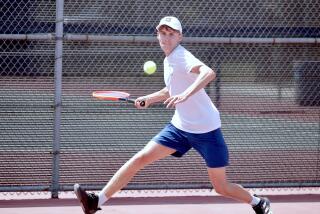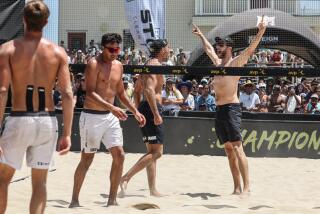50 Take to the Court in Wheelchair Tennis Event
- Share via
Paul Garner pulled a tennis ball from the spokes of his wheelchair and arced it gracefully over the net.
He immediately raced toward center court, freeing one hand in time to hit the return ball that cruised toward him. A clockwise pirouette of the chair placed him in position to smash the next volley.
But the 53-year-old Oxnard resident’s efforts were not enough to win a doubles match at Ventura College on Sunday afternoon. He muttered over the loss as he rolled off the courts, clenching his tennis racket in his teeth.
“I know we could have won,” he said.
Garner was one of 50 contestants competing in the two-day Gold Coast Classic Wheelchair Tennis Tournament, the first such contest held in Ventura County, said Lynda Fleisch, spokeswoman for the Ventura Parks and Recreation Department.
Tennis players ranging in age from 11 to 70 came from as far away as San Diego and San Francisco to compete in various divisions of the tournament, sponsored by the department and St. John’s Regional Medical Center.
The event was sanctioned by the Wheelchair Tennis Players Assn., which has about 1,000 members who are ranked by playing in tournaments nationwide and in Europe and Japan, said Glenn McIntyre, a tournament organizer. The rules are the same, except that the ball can bounce twice before it is considered dead.
McIntyre, a world-ranked wheelchair tennis player, brought the idea of a tournament to the attention of Ventura city officials. McIntyre, a 29-year-old Oxnard police officer who lost the use of his legs after a car accident, teaches a wheelchair tennis class through the city, Fleisch said.
He said the tournament, which is scheduled to become an annual event, encourages people in wheelchairs by helping them meet others and realize that they too can compete in sports.
“If you’re in the chair and you come here, it’s inspiring,” McIntyre said. “You don’t feel so out of place.”
Garner said tennis helped him feel better about himself after his legs were amputated. He lost one leg in December, 1982, and the other in January, 1983, after an arterial disease decreased circulation in his limbs, he said.
A gray-haired man with a mustache and suntanned face, Garner said that at first he did not care whether he lived or died. Garner, who had once loved to play football and basketball on weekends, resigned himself to a sedentary life.
“I figured I’d just hang around and drink beer and watch TV the rest of my life,” he said.
But Garner said his outlook improved after he met his physical therapist, who demanded that he learn how to function in a wheelchair. He later married her, and the couple has two daughters, 2 and 4. Garner has two daughters, 26 and 31, from his first marriage.
To keep in shape, Garner started lifting weights and pushing himself on long runs in his wheelchair. But he said wheelchair “running” left him with too much time to think about things.
“Mostly I would think about, ‘God, why did this happen to me? How can I make a living?’ ”
He said tennis requires more concentration and takes his mind off his problems. “Tennis is like a drug,” Garner said. “It’s addictive.”
Garner said he discovered wheelchair tennis by chance when he was visiting friends in San Diego last year and attended a wheelchair tennis tournament in the area. He decided right then that he wanted to play.
“I didn’t know how to score. I couldn’t get the ball over the net,” he said. “But it didn’t discourage me. It made me want to do more.”
He entered his first tournament last year, but was forced to abandon the game for four months this year when he had a kidney removed. It was the same disease that cost him his legs.
Sitting on a sunny court after the match, he cried as he thought about the time in the hospital. “I never thought I was going to play again,” he said.
But 10 days before the Ventura tournament, doctors gave Garner the go-ahead and he hit the courts to begin practicing. He said he plans to compete in another tournament in September.
“It just makes you feel great,” Garner said. “It lets you know you can compete.”
More to Read
Go beyond the scoreboard
Get the latest on L.A.'s teams in the daily Sports Report newsletter.
You may occasionally receive promotional content from the Los Angeles Times.










